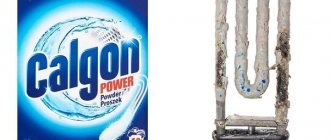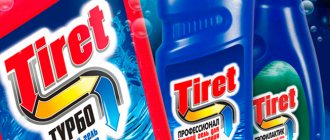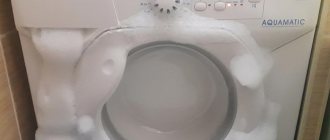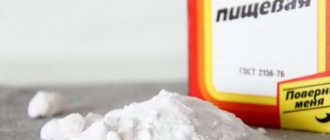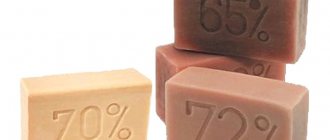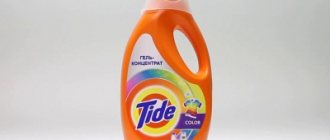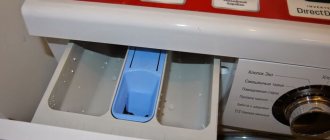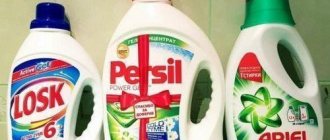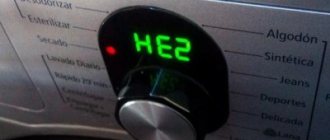There are conflicting opinions among Internet users regarding the use of the sensational Calgon machine tool. Great interest in the product is, rather, the result of high-quality marketing than its “miracle properties” in the fight against scale. The high cost and unproven effectiveness of this water softener encourages users to look for cheaper “anti-scale” agents for washing machines. We will tell you in this article what can be used as an analogue of Calgon.
Characteristics and composition
Calgon product consists of several active components.
The most active ingredient is sodium tripolyphosphate. It is this that immediately begins to enter into a peculiar reaction with calcium ions contained in the water. Due to this effect, the level of liquid hardness is normalized, and scale stops forming. Other components include:
- polycarboxylates;
- microcrystalline cellulose;
- surface-acting substances.
It is important that the smell of this product is light, not overwhelming and even pleasant. So Calgon additionally helps fight unpleasant odors that the washing machine begins to emit over time
Purpose
In addition to preventing scale formation, this product effectively copes with other important tasks. This is achieved due to the unique composition and active substances. Other properties of Calgon include:
- it protects the car from possible breakdowns;
- promotes economical powder consumption;
- increases the efficiency of the washing itself;
- improves the operation of household appliances.
Preventing breakdowns
Since scale stops forming, it no longer settles on the internal elements of the device itself. As a result, the washing machine does not fail, works well, and thereby extends its service life.
Powder saving
Under the influence of such a product, water is significantly softened and its properties are improved several times. The powder begins to transform into rich foam. Its particles dissolve completely, thereby helping to reduce detergent consumption.
Washing efficiency
Thanks to its unique effect, Calgon really has a positive effect on the efficiency of the washing process. The fact is that in soft water all fabrics are cleaned much better. This makes it possible to remove even the most corrosive stains and old dirt.
Maintaining material characteristics
Due to the effect that Calgon has on the structure of water and on the elements of the washing machine, washing is more delicate and gentle. As a result, the material retains its softness and original color.
By ridding the washing machine of scale, this preparation protects the fabric from increased hardness and from coloring it gray.
What should I use instead of Calgon?
First, it’s worth figuring out why the controversy surrounding this product does not subside on the Internet? After all, if you look at it, it performs its functions perfectly, namely, it softens the water, which prevents the formation of scale and limescale on the internal parts of the machine. So what's the catch?
It's actually simple. Buyers consider the high cost of Calgon to be unreasonable. More than three hundred rubles per kilogram, but such a package lasts, at best, for a month. Of course, there is no sign of saving here. In addition to all this, if you carefully look at the composition of the product, you can find out that it contains the simplest elements: soda and sodium tripolyphosphate, due to which the water is softened.
There are less expensive complete analogues of Calgon on the Russian market. Let's give examples.
- Antiscale. The most popular product among Russian users. The quality is in no way inferior to advertised brands, and costs about 30 rubles.
- Alphagon. A package of half a kilogram of powder costs 70 rubles. However, the proportion of the main substances is designed in such a way that the consumption is halved.
- There is no scale. The half-kilogram package is consumed extremely economically. Not only softens water and prevents scale, but also effectively helps get rid of it.
- Luxus Professional. The peculiarity of this domestic product is that after using it, a pleasant light aroma of lemon remains in the machine. Well, it copes with its main task at 5.
- Top House. Product made in Germany. Quite budget friendly. Well suited for cleaning scale and deposits not only from washing machines, but also from other household appliances.
- Magic Power. This is a liquid gel cleanser that is sold in ¼ liter dosages. It works “pointwise” and is very effective; it is produced in Germany.
Thus, Calgon has no shortage of competitors. They are not inferior to it in efficiency, but they differ very favorably in cost. As a means to combat dirt on the insides of SM, instead of Calgon, you can use ordinary citric acid in the following proportion: 200 grams of product per machine with a load of 4-5 kilograms.
The powder should be placed in the detergent tray. Then the idle wash mode is activated. In this case, the water temperature should be as high as possible, the optimal being 90 degrees. As a result, you will get a machine without scale and lime, as well as excellent disinfection and elimination of unpleasant odors.
Citric acid or Calgon
Many housewives ask the question: “What is better to use when washing: citric acid or Calgon?” Let's figure it out.
As described above, thanks to its composition, Calgon protects the washing machine and things during washing. Thanks to it, the machine works efficiently and will last you twice as long. The composition of the entire Kalgon assortment is identical. Citric acid is not included there. However, in itself it helps to get rid of unwanted scale. It is not advisable to use citric acid with every wash.
To clean scale and limestone, it is recommended to run an empty drum with the addition of citric acid and set it to “Normal wash” no more than once a year. Thanks to this, your washing machine will be doubly protected, and the drum will acquire a shiny hue.
Therefore, when asked what is better to use, we can say that with each wash - Calgon, and once a year - citric acid.
What does it consist of?
Contrary to expectations, the composition of the powder is not that complicated. It contains only a few main components.
- Polyethylene glycol in a proportion of less than 5%.
- Microcrystalline cellulose in a proportion of 5 to 15%.
- Polycarboxylates make up from 15 to 30% of the total mass of the substance.
The remaining half of the product is formed by ordinary sodium tripolyphosphates and... soda! Some element names don't sound very friendly, but don't worry
The composition of Calgon is completely harmless to human health if used as intended and precautions are taken. For example, be careful not to get the powder in your eyes or inside your body.
In the first case, rinse your eyes thoroughly with water. In the second, you need to drink as much water as possible and seek help from a specialist.
The rest of the precautions are familiar to every housewife: pour in a measuring spoon to avoid overdose, store out of the reach of children and away from sunny things. Also, in order to avoid unpleasant situations, it is better to keep the powder away from any food products.
Recommendations for using Calgon are in the instructions; it must be added to the machine in the required quantities when washing.
Damage from scale
Limescale causes significant harm to the washing machine, namely:
- A heating element covered with scale deposits loses thermal conductivity, as a result of which its coil overheats and the part fails;
- The appearance of dirt inside the machine leads to clogging of the drain system, which leads to its breakdown;
- Scale deposits on the internal parts of the machine reduce its service life by at least half.
Important: the use of inappropriate cleaning products or improper cleaning of the automatic machine provokes the appearance of scale with even greater force. Before carrying out work on cleaning the washing machine, it is necessary to consult with specialists or study the manual for performing such work in order to do everything correctly. It does not matter which car is going to be cleaned - Bosch, Indesit or another brand.
What are its analogues?
Professional anti-scale products usually contain acids. They are the ones who dissolve scale and help clean the machine. They are not used in the process of washing clothes, but separately, starting the cycle in idle mode, that is, with an empty drum.
Almost all descalers contain various acids.
You can fight scale with the help of folk remedies.
Lemon acid
The instructions for cleaning the washing machine from scale with citric acid are not much different. 150-200 g of product is placed in the washing powder compartment. Some people prefer to pour half of the citric acid directly into the drum, but you can do that.
Citric acid can be quite effective in combating scale.
Citric acid is poured into the powder compartment.
For disinfection purposes, regular bleach can be added to citric acid.
Vinegar
The description of the manipulations is similar, but there is a slight difference. Approximately 15-20 minutes after starting the cycle, the machine with vinegar (2 glasses) is stopped for an hour (“pause” mode).
Regular table vinegar can help remove scale from your machine.
Customer reviews
After studying customer reviews, we can draw the following conclusions. 85% of housewives use Calgon every time they wash their clothes. Description and composition are indicated on the packages. Women are very satisfied with the product and do not want to switch to using something else. Another 10% of women use other means, considering them the most effective. 2% prefer to “clean” their washing machine with citric acid, believing that it protects better than powders or gels. The remaining 3% do not protect their car from breakdowns, not believing advertisements.
Is Calgon really effective?
The product not only softens water. It prevents the appearance of scale on the heating element of the washing unit. If it appears on an element, you will need the help of a wizard. To prevent machine damage, it is recommended to add powder with each wash. The main advantages of the product are:
- less washing powder is needed, Calgon softens the water, so it requires a small amount of detergent;
- prevents the appearance of scale on the internal elements of equipment and components, ultimately increasing the service life;
- maintains the clean condition of the drum compartment;
- Helps remove stubborn stains from clothes;
- maintains the brightness of colors because scale does not settle on the fabric.
Many users wonder whether it is safe to use a laundry detergent and whether it will do any harm. Despite the fact that the powder contains chemicals, experts say it is no more dangerous than simple powders. When immersing Calgon in the washing compartment, you do not need to wear gloves. But there are some recommendations for using the powder:
- must be stored in a place protected from light and difficult to reach for children;
- If the product accidentally gets into the eyes, mucous membranes - mouth, nose, then immediately rinse with plenty of water.
In the latter case, tablets will eliminate the risk of the drug getting into the eyes. Calgon acts on scale with active ingredients. If a layer of lime more than 1 mm thick is found on the heating element and in the drum, electricity consumption in the house will increase by 10%. But the powder can cope with the problem.
There are studies that prove the ineffectiveness of Calgon. Some experts claim that it is similar in composition to washing powder, which also contains water softening substances. In addition, Calgon only prevents the appearance of scale in the washing machine, but does not remove existing scale.
There are already a sufficient number of reviews about the pointlessness of using this product and even that it can cause a malfunction of the washing machine. If you have never used Calgon and scale has formed in your washing machine, then you can always clean it with folk remedies, for example, ordinary baking soda, vinegar or citric acid.
In this article we have provided detailed instructions on how to use Calgon for washing machines. They told me where and how much to pour Calgon into the washing machine. Now you just have to weigh all the pros and cons, calculate the amount for the purchase of Calgon and a new washing machine and determine whether to use an additional product when washing or not.
Hard water
Before talking about its usefulness or uselessness, as well as the need to use a class of substances with similar properties, it is worth understanding two questions:
- What is “water hardness” (read about the composition of spring water here)?
- What properties does Calgon and similar substances have?
Nature of the phenomenon
In scientific terms, water hardness is certain physical and chemical properties that are associated with the content of metal salts in water, mainly:
- calcium and magnesium.
The following conclusion follows from the definition:
- if there are a lot of salts, then the water is hard,
- if it’s not enough, it’s soft.
These names have historical roots.
When washed with soap containing fatty acid fragments, the fabric became hard to the touch.
What do you know about the Karcher window cleaning device? A technical description of complex household appliances and rules for safe operation are published in a useful article.
What temperature of water should be in the batteries during the heating season is indicated on this page.
When talking about water hardness , two concepts should be distinguished:
- temporary
- and constant rigidity.
Temporary or non-carbonate is water that contains hydrocarbonates.
Constant - due to the presence of sulfates and chlorides.
All these names sound incomprehensible and not scary. But there are differences between types of rigidity, and significant ones.
Hydrocarbonates are destroyed during boiling and precipitate on the walls and heating elements.
Permanent hardness can only be removed using a reagent method..
From the above, we conclude that temporary hardness is dangerous for washing machines, due to which the following occurs:
- dry skin,
- Detergents do not foam well,
- scale forms.
INTERESTING . Fully softened water harms metal products almost more than hard water.
By removing salts, we remove the influence of the acid-base buffer, which does not allow corrosion processes to spread at high speed.
What can be replaced
If you don’t have such a product at hand, and when washing you want to protect your washing machine from scale formation, then you can use analogues that are similar in their effect. This can be not only store-bought products, but also handy home remedies.
Vinegar
You can try using vinegar 9 percent. This product should be poured into the compartment intended for the main wash.
It is important to choose a high temperature mode. But it is not recommended to reload the drum itself
Soda
Ordinary soda will help reduce the hardness of the water used at home, and thereby protect internal parts from possible deposits. There are two ways to use it:
- In the first case, you need to pour the soda along with the powder. This will make it possible to soften the water.
- In the second case, you need to pour a little soda into the compartment intended for washing powder, and then run the shortest wash, without loading things into the machine. The operating time of the device should be forty minutes, and the temperature should not be below sixty degrees.
Lemon acid
Citric acid is quite effective. Sixty grams of it is poured into the compartment intended for powder. In this case, you need to select a washing mode with a temperature of at least 70 degrees, but you do not need to load things into the machine. This method will dissolve accumulated scale.
Antiscale Nast
This is an effective remedy at an affordable cost. But the effectiveness is less than that of Calgon. It will be able to prevent the formation of scale, but will not improve the quality of washed laundry.
Alfagon
Alfagon is an excellent and cheaper substitute that has properties similar to Calgon. It also softens hard water, but this product will not be able to rid machine parts of existing scale.
When does the application not make sense?
The use of Calgon is not justified in all cases. It is useless to use this drug if:
- the house has a water filtration system with softening;
- a washing mode with a temperature below 60 degrees is used, since at a low temperature scale particles are not formed.
In addition, any modern detergent in automatic washing machines already contains water softening additives. And if the water hardness in the region is moderate, these additives are enough to prevent scale formation. If the water is hard, then additional softening agents should be used.
Compound
On each package of Calgon product the composition is indicated:
- sodium tripolyphosphate (50%);
- polycarboxylates (up to 30%);
- microcrystalline cellulose (up to 15%);
- polyethylene glycol (up to 5%).
The principle of operation is based on a chemical reaction between calcium ions, which cause water hardness, and sodium salts in the powder. Polycarboxylates and ethylene glycol help neutralize limescale and protect washing machine parts.
Description of the product
The Calgon brand comes from the USA and is owned by the Reckitt Benckiser corporation, which also owns 16 trademarks, including Dettol, Durex, Finish, Vanish, Veet. The manufacturer is the same Reckitt Benckiser LLC, the plant in the Russian Federation is located in the Moscow region.
The range includes powder, tablets and liquid products that have the ability to neutralize hardness salts in water. The substances in the product prevent the accumulation of scale on the parts of the washing machine, save powder when washing, and make the process more efficient.
"Kalgon"
pros
"Kalgon" helps to achieve not only the removal of scale, but also has a number of advantages over its analogues:
- if you add the powder together with the main detergent, the consumption will be more economical;
- in soft water, the removal of contaminants from fabric fibers is faster and therefore more effective;
- the service life of household appliances increases, there are no unexpected expenses for repairs;
- When washed, products do not lose color saturation, since there is no longer a gray deposit of scale.
The shape of the tablets allows you to use the product in doses (no need to measure anything). It is also easier to store compressed powder; there is no risk of inhaling particles, they will not remain in the air.
Are you unplugging your washing machine?
Oh yes! No
Directional action of Calgon
Tap water consists of many salt impurities that settle inside on the walls of the washing machine. The second layer is applied to the first layer and so on. To function well, an electric heater needs to generate more energy, so it works with overloads and often fails.
Calgon will help prevent breakdowns. Usually you have to change a part, or a group of elements. The costs will be significant, so regular water softening will cost much less.
Application
The dosage of the product depends on the degree of water hardness. If it is large, then each wash will require more:
- For high hardness, you need 90 ml of gel or 80 g of powder.
- For average – 60 ml of gel or 60 g of powder.
- For low temperatures – 30 ml of gel or 40 g of powder.
Expert opinion
Dosing tablets is even easier - you need to add 1 tablet for each cycle under any operating conditions.
Dry products are added directly to the powder, and liquid forms are poured into the rinse compartment or added to the washing gel.
The main benefits of "Calgon"
The mechanism of scale formation on heating elements is quite simple. When water is heated to a temperature above 60 C, the salts it contains begin to settle on the metal parts of the machine. Over time, the layer of such deposits becomes thicker. The most common causes of such problems are magnesium and calcium particles.
Scale, which has low thermal conductivity, forms a kind of insulating layer between the hot heating element and cold water. As a result, the machine begins to consume much more electricity to heat water. And the heating element itself constantly works with overloads, which ultimately leads to its breakdown.
Industrial and popular analogues
There are many water softeners on the household chemicals market. Among them:
- Modern washing powders with the addition of improvers.
- Magic Power is a liquid descaling agent for household appliances made in Germany.
- Luxus Professional has a pleasant lemon scent. Fights hardness salts in the washing machine.
- Dr. Beckmann has earned a reputation for being an expensive but effective water softener.
- Top House is a budget option for combating deposits in the form of a German-made gel.
- “No scale” is a Russian development designed for the prevention and removal of scale in powder form.
Do you wash your shoes in the machine?
Oh yes! No
There are a number of folk ways to combat scale. The most common option at home is the use of acids when washing. This could be lemon juice, boric acid or vinegar.
Recipe 1: 50 g of crystalline citric acid is poured into the powder compartment and the machine is set to drum cleaning mode. It is enough to carry out the procedure once a month and clean the lower twist-out filter at the same time.
Recipe 2: Add the same amount of boric acid purchased from a pharmacy to 50 ml of hydrogen peroxide. Add the solution to the rinsing compartment. We load bed linen into the drum and turn on the program with regular powder.
Expert opinion
After washing, the products will become softer, and the machine will be cleaned of minor plaque deposits. If you use this method once every 2 months immediately after purchasing a new automatic machine, scale prevention is ensured.
Recipe 3: 5% vinegar solution (90 ml per 5 liter load) will not only effectively remove plaque from the heating element of household appliances, but will also add brightness to colored cotton items. The only condition is an additional rinse after the main wash cycle.
Reviews from the Internet
“I often have to deal with branded clothing and delicate fabrics. For 5 years I have been continuously using Calgon in my laundry. I only use the delicate mode. And I noticed that at low temperatures things began to look brighter, the fabrics did not lose their shape, and a gray coating did not appear on white items.”
Olga, 35 years old, Ufa
“I have been using Calgon gel for washing for 8 years now and the moldy smell has stopped appearing in the washing machine. I do laundry often, I have 4 children, but with such a load, our machine has already celebrated its 10th anniversary and has never been repaired.”
Anastasia, 48 years old, Stavropol
“I often deal with heating elements in washing machines breaking down due to scale formation. I didn’t notice that customers who use Calgon or other expensive water softeners contact us less often than those who wash with other powders. I think that in everyday life it is much more effective to follow the washing regime, do not add more detergent than the prescribed amount and wash less often at temperatures above 60 degrees. Citric acid once a month will get rid of plaque problems just as well.”
Peter, 36 years old, household appliance repairman
Previous
Next
Tips and videos
Calgon packaging contains recommendations from leading manufacturers of household appliances. This means that these companies tested the product on their products and were convinced of its harmlessness for the operation of the machine.
Equipment repair specialists advise:
- You should not skip a single wash if you start using Calgon for prevention.
- There is no need to use other cleaning methods in conjunction with any household chemicals to enhance the effect. You can damage the plastic parts of the machine.
- It is prohibited to exceed the dosage of powders and gels. This will not increase their effect at all.
To avoid frequent problems with the operation of the washing machine, prevent the formation of scale on its parts, and prevent mold deposits and mucus, it is worthwhile to properly care for the equipment. The use of special additives to neutralize hardness will avoid frequent repairs and protect items during washing.
Calgon release forms
Calgon is available in several different forms. This allows you to choose the most suitable option for convenient use. Some people like to use the product in the form of a gel, while others choose the tablet form.
Powder
Calgon product in powder form is packaged in packages of different weights. This allows you to first purchase a small amount of the drug just to test it in action. The only negative is that it is not always convenient to measure the powder, as it can spill onto the floor.
Pills
Calgon tablets are packed in boxes. There can be a different number of them in one package, ranging from twelve pieces to more than fifty. This form of release is very convenient to use, since you can always measure the required dosage of the drug.
See also
How can I replace synthetic washing powder for an automatic machine?
Gel
Liquid Calgon is presented in the form of a gel. It is sold in bottles of different capacities. The largest is two liters. Many housewives like this form of release. The gel is convenient to use and can be stored compactly. And thanks to its structure, such a product quickly penetrates the necessary elements of the machine.
Tips and videos
Calgon packaging contains recommendations from leading manufacturers of household appliances. This means that these companies tested the product on their products and were convinced of its harmlessness for the operation of the machine.
Equipment repair specialists advise:
- You should not skip a single wash if you start using Calgon for prevention.
- There is no need to use other cleaning methods in conjunction with any household chemicals to enhance the effect. You can damage the plastic parts of the machine.
- It is prohibited to exceed the dosage of powders and gels. This will not increase their effect at all.
To avoid frequent problems with the operation of the washing machine, prevent the formation of scale on its parts, and prevent mold deposits and mucus, it is worthwhile to properly care for the equipment. The use of special additives to neutralize hardness will avoid frequent repairs and protect items during washing.
What is the remedy for?
Water softening is the main function of the product. If you regularly use Calgon for washing machines, the formation of salt deposits is reduced, and equipment breakdowns and the need for repairs in the future are prevented.
However, the softener also performs a number of other tasks. By reducing water hardness:
- The quality of washing clothes improves, and difficult to remove stains are easier to remove.
- The consumption of washing powders and other detergents is reduced.
- White things remain white (due to the normalization of calcium content in water).
- After washing, things become softer.
The softener eliminates the rotten smell from the machine drum. Its use does not harm tissues or human health.
What is Calgon used for?
Calgon for washing machines is a product designed to soften hard water, as well as the formation of scale on the heating element of the machine during the washing process. Scale that forms on the internal elements of the machine can lead to breakdown. This is why machine manufacturers recommend adding powder when washing to soften the water. Calgon is perhaps the most famous of these powders, which is why it came to the center of our attention.
The advantage and necessity of using Calgon is as follows:
- firstly, by softening the water, the amount of washing powder required for one wash cycle is reduced;
- secondly, it protects against the formation of scale on machine parts, which can lead to its breakdown;
- thirdly, it prevents scale from settling on the linen, which can cause white linen to turn gray after just a few washes;
- fourthly, clothes are washed better in soft water, especially for stubborn stains.
Despite the benefits and benefits of Calgon, some wonder if it affects health? According to some experts, the substances included in its composition do not have a negative effect on human health. You don't have to wear gloves when pouring Calgon into the machine.
However, precautions still need to be taken
The effectiveness of Calgon: truth or myth?
There is an opinion that Calgon is not as effective as its manufacturers claim. Judging by some consumer reviews, it is not effective at all. Opinions about the ineffectiveness of Calgon are confirmed by recent laboratory tests. It turns out that Calgon is very close in composition to ordinary powder. Its water softening components are identical to those contained in any automatic washing powder.
Experienced housewives have long confirmed this fact by observing the results of washing using Calgon. As for protecting the elements of the washing machine, not everything is clear here either. There are facts confirming the formation of scale on the heating element of a washing machine, both with Calgon and without it. Moreover, in some cases, Calgon can cause the washing machine to break down.
Supporters of the use of Calgon indicate that its components have a beneficial effect on linen. With it, white things do not turn gray and, in general, wear out more slowly. So, whether Calgon is needed for the machine is up to you to decide. Carry out simple calculations, determine how much money you will spend on Calgon in 5 years. These funds can be used to purchase a new washing machine.
You can watch a video about how effective Calgon is.
What can replace Calgon?
If you are a supporter of using water softeners when washing, then you don’t have to spend money on the much-advertised Calgon. You can choose cheaper chemicals - analogues. A good example of a Calgon substitute is Alfagon. Thanks to Alfagon, washing costs can be reduced by 2 times. And if you soften water with baking soda, then you don’t have to talk about costs at all.
If scale has already formed on the heating element of the machine, you can use means to remove it. Otherwise, breakdown cannot be avoided.
How to replace Calgon, since Alphagon is not the only substitute? On store shelves you can see such a product as “Eona anti-scale”. It contains components that soften and acidify water, which prevents the formation of scale and makes washing more efficient.
To summarize, we note that the question of how to use Calgon may not be the most difficult. Experts say that if you use Calgon, then use it for the entire life of the washing machine and under no circumstances use it from time to time. Occasional use of such products hopelessly damages the washing machine.
An advertising campaign in the media advocating the use of Calgon convinced any family with a washing machine that they could not do without this product (its manufacturer is from Germany). Did the ad makers overdo it? It is also worth figuring out how to use Calgon for automatic washing machines.
Result of using the product
Most often, hard water flows from our taps. You may ask, what's wrong with this? Hard water always leads to the formation of plaque and scale. All this forms on all the internal parts of your washing machine. With each wash, hard water passes through many parts, leaving a mark on them. Ultimately, your machine will quickly break down. As mentioned above, repairs will be quite expensive, and the result of the further operation of the washing machine is unknown.
During any wash, the heating elements of the washing machine heat up to a temperature of 100-110° C. “Calgon”, due to its chemical composition, dissolves and softens hard water. Thus, it protects all important parts of the machine from scale formation on them. After which the washing machine will work twice as long, more efficiently, and the quality of washing will remain the same. In addition, Calgon will help maintain the softness and color of your items.
Search for cheap analogues
Having studied the composition of Calgon, it is quite possible to replace it with substances of similar content, manufactured in industrial production or available at home. Similar industrially produced cleaners include the following:
- "Alfagon" - Turkish anti-scale powder. Designed specifically for washing machines. The cost of 500 g of the drug is 70 rubles;
- "Yplon Anti-Calc" is an anti-plaque agent of Belgian origin. Available in powder and tablet form. The price of 950 g of the product is 170 rubles;
- "Antinakipin" is a softener produced by a domestic manufacturer. Its cost for 500 g is indicated at 80 rubles;
- “Magic Power” is a German-made product used to remove salt deposits on the internal parts of the washing machine. Produced in the form of a 250 ml liquid;
- “Top House” is a universal German liquid designed for cleaning various types of household appliances. Available in liquid version with a volume of 0.5 l.
Manufacturers of household appliances do not recommend using water softeners that are used for other devices. But, given their composition, we can come to the conclusion that cleaners for dishwashers are also suitable for washing machines. One of such drugs on the market is Finish. The active ingredients are sodium tripolyphosphate and polycarboxylate components. The same elements are contained in Calgon, so the effect will have the same properties.
In addition to chemical mixtures, citric acid is used for hard water. This food ingredient removes scale that has already formed and helps prevent it further. To clean a washing machine with acid, you should put 100 g of powder in the drum and set it to the longest wash cycle. It is not recommended to place laundry at this point. As a preventative measure, the procedure should be performed every six months.
Soda ash is considered an equally effective means of softening water. A small amount of the mixture is poured along with the powder into a special hole during each wash. The heating temperature should not exceed 50 degrees. When placing white items in the drum, a whitening effect is achieved.
Regular baking soda will help remove water hardness when washing. It is enough to add 3 tbsp. spoons of mixture to powder with each wash. This approach will not only protect the heating element from plaque, but will also make the laundry cleaner. Do not use the product for washing delicate fabrics.
Table vinegar has proven itself well in the fight against limescale. One application is enough to dissolve deposits on the tank and drum. The product copes well with unpleasant odors and germs. To clean the drum with vinegar, you need to: pour the product into the powder compartment, run the wash cycle for no more than 1 hour, and additionally select the rinse function.
Bleach is considered one of the most economical cleaning agents. Its greatest disadvantage is its high toxicity. Therefore, it is permissible to carry out cleansing with its help no more than 2 times a year. The solution is diluted with water in equal proportions, and the same manipulations are carried out as with vinegar.
It is worth noting that there are a sufficient number of Calgon analogues, but it is necessary to choose a product based on the price-quality ratio. As practice shows, there is no need to focus on high-cost goods
Before choosing a cleaner, it is important to study the chemical composition of the mixture
Reviews from housewives
Consumers themselves have a mixed opinion about Calgon. Some housewives believe that this softener really works and protects the machine from damage. Many consumers even note the fact that this product, oddly enough, helps get rid of the smell in the drum very well. And “Calgon” itself, judging by the reviews, smells quite pleasant and unobtrusive.
Reviews about this product, therefore, are also positive. However, in most cases, housewives are somewhat skeptical about this softener. This is due primarily to its simple composition and at the same time very high cost.
The price for a standard 1.1 kg pack of Calgona is about 400 rubles. This amount of softener only lasts for a month. Many housewives therefore advise replacing Calgon with simpler and cheaper home or industrial products that also cope well with scale. Among other things, some consumers note the fact that this softener caused them an allergic reaction.
How to use Calgon
Many people have heard about the popular substance that protects the washing machine. But not everyone knows how to use it. The instructions for use will teach you where to put the product and how much you will need for one wash. This information is located on the packaging.
To determine the degree of hardness of tap water (soft, medium, hard and very hard), use an express test for aquariums, which can be purchased at a pet store. Having medium hardness, it is worth taking a third of a measuring cup (gel or powder), i.e., only 32 ml. To soften hard water, you need to have more product - 2/3 cup - 64 ml. If the water is very hard, you need to add a full measure of Calgon.
Gel and powder are placed in the main compartment of the tray along with the detergent. It is not recommended to put it directly into the drum of the washing machine. If these are tablets, then one is enough, despite the hardness of the water. When clothes are washed in water softened with Calgon, less washing powder is used.
Important! The product will be highly effective if used continuously. And a quick tip of caution: store the product in a dry, dark and cool place, out of the reach of children, away from food
And if Calgon gets on the mucous membranes, it is quickly washed with cold water
And a quick tip of caution: the product is stored in a dry, dark and cool place, out of the reach of children, away from food. And if Calgon gets on the mucous membranes, it is quickly washed with cold water.
Instructions for use
On the packaging of Calgon powder there are instructions for use, which indicate the amount of powder required for one wash cycle. According to this instruction:
- with average water hardness, it is enough to pour 1/3 of a measuring cup, the volume of this cup is 96 ml, which means that in this case only 32 ml of powder is needed;
- with hard water, you need to pour 2/3 of the glass, that is, 64 ml;
- If the water is very hard, you need to add a full glass of powder.
Where to put Calgon in the washing machine? The answer to this question is also in the instructions on how to use Calgon. Calgon is poured along with laundry detergent into the main compartment of the washing machine tray; as a rule, this compartment is larger in size than the other two. There is no need to put it into the drum with the laundry, even though it does not have an adverse effect on the fabric. You don’t have to wonder which compartment of the machine to pour the product into, but rather mix it with the powder.
If you do not use powdered Calgon, but in tablets, then one tablet is enough, regardless of the hardness of the water.
In addition, the effectiveness of this product will only be achieved if it is used every time you wash. The instructions also say that when using Calgon, you need to sprinkle powder for washing things, taking into account that washing is carried out in soft water.
Characteristics and composition of Calgon
So, everything is clear about where to pour the water softener and in what quantities. Let's look at what substances that make up Calgon make water softer.
The main component of Calgon is sodium tripolyphosphate, which interacts with calcium ions contained in water, thereby reducing its hardness. In addition, the composition includes polycarboxylates (up to 30%), microcrystalline cellulose (up to 15%), polyethylene glycol (up to 5%) and surfactants. Calgon has a light, pleasant scent. This product has three release forms:
- powder;
- pills;
- gel.
They are all identical in composition, so the choice depends on the personal preferences of consumers. The only advantage of tablets over gel and powder is their convenient dosage.
The range of Kalgon products is wide, which provides choice. It is available in different dosages:
- the powder is packaged in 0.55; 1, and 1.6 kg;
- tablets are packaged in boxes of 12, 15, 32, 35, 40, 70 pcs. and others;
- the gel is packaged in bottles of 0.75; 1.5; 2 l and others.
Calgon's analogues
Having familiarized yourself with the composition, it is worth finding out what similar products exist. Thanks to the simple components included in the product, it can be replaced with industrial analogues and folk compositions. Store-bought drugs:
- "Alfagon" is an anti-scale powder. Made in Turkey. It is used for different types of washes. A 500 g package costs about 80 rubles.
- Yplon Anti-Calc is an anti-limescale product produced in Belgium. Form – in the form of powder and tablets. The cost for 950 g is 170 rubles.
- Antiscale is a Russian softener. Price – 90 rub. for 500 g. The manufacturer recommends not using preparations for the machine that are designed for cleaning other equipment.
- Magic Power is available in liquid form. It removes scale well from equipment.
- Brand Dr. Beckmann has proven itself to be an effective softener, but expensive.
- Luxus Professional smells pleasantly of lemon. Softens the salts of water in the washing machine.
- Top House is produced in Germany. The analogue is cheaper than Calgon.
In addition to store-bought formulations, the user uses home remedies that will do a good job of cleaning parts and getting rid of plaque. List of effective products:
- Lemon acid. To remove lime from the drum and walls of the machine, add only 2-3 tbsp. l. Washing is carried out without immersing the laundry, the temperature is set to 90℃. The procedure is carried out once a year.
- Soda ash perfectly softens hard water and corrodes scale. It is added with every wash.
- Acetic acid will also help remove limescale. But cleansing with the product must be done more often than with lemon. The frequency is once every 3 months.
Reviews from housewives about the effect of the product are contradictory. Some women criticize the composition and believe that it is a deception. It can be easily replaced with soda ash. In addition, if you regularly pour powder inside the washing machine, plaque will still appear. Other users are delighted with Calgon. Residents of city apartments especially love it. They note a significant softening of water, savings in washing gel, and good color of clothes when white T-shirts do not turn gray. After washing, the clothes become soft and pleasant to the touch.
Everyone will make their own decision whether to use Calgon for the machine or not. We found out what the product consists of. It contains gentle components that do not harm human health. The main thing is to avoid getting the powder into the eyes and mucous membranes. The composition is designed for regular use. It is poured into the compartment with powder or a tablet is placed every time you wash it. Otherwise, Calgon's actions may not be noticed.
Powder composition
The chemical components of Calgon laundry detergent look like this:
- Na2CO3 – soda ash;
- Na5P3O10 – sodium tripolyphosphate.
Sodium carbonate, also known as soda, perfectly cleans and disinfects things. It removes unpleasant, old and stale odors. With its help, the water becomes soft.
Sodium tripolyphosphate is a salt of polyphosphoric acid. The component is used in the food industry. It is found in cleaning products and fights fats.
In addition, the composition contains polycarboxylates, which are a set of aggressive acids, their volume is about 30-35%. The substances are strong electrolytes; they conduct electricity. Calcium caroxylate dissolves in liquid. Polyethylene glycol is a polymer compound that functions as a flavoring agent. It is used in the following formulations:
- ointments;
- nutritional supplements;
- laxative;
- solvents.
Microcrystalline cellulose contributes to the formation of the powder structure. Plant fiber is presented in its pure form. It is extracted from cotton. Three main components - soda, carboxylates and sodium tripolyphosphate - combine ions of calcium and magnesium salts and prevent the formation of limescale on important parts and components of the washing machine.
Procedure for using anti-scale agent
When talking about the procedure for using the anti-scale agent “Antinscale”, it is impossible to unify the instructions. After all, anti-scale is not one product, but a group of products, and they are all different, produced by different manufacturers in various forms and used to clean different materials and surfaces. Let's look at the types of anti-scale products for washing machines
And let’s focus on the order of their use.
Antiscale for washing machines under the Furman brand. A specialized anti-scale agent that protects the drum and heating element of the washing machine from scale and salt deposits. The product does not harm the rubber parts of the machine after a single use. Packaging – 50 g sachet. Dosage – 1 sachet, 1 application. Frequency of use – once every 6 months. Directions for use: pour the contents of the sachet into the empty drum of the machine, select any mode (only with a temperature of 30-40 C) and wash.
Anti-scale for washing machines and dishwashers from Greenfield Rus. The product is intended for quickly cleaning parts of the washing machine and dishwasher from limescale. Packaging – pack of 250 g. Dosage – 60 g per application. Frequency of use – once every 6 months. Directions for use: pour 60 g (no more) of the product into the empty drum of the machine, select a mode with intensive rotation of the drum and a temperature of 40 C and wash.
Liquid anti-scale agent “Cinderella”. Multifunctional liquid product designed for cleaning kettles, pots, dishwashers and washing machines from limescale. When used correctly, the product does not damage the rubber parts of the washing machine. Packaging – 250 ml bottle. Dosage – 2 caps per 1 application. Frequency of use – once every 6 months. Directions for use: mix 2 caps of the product with 1 glass of water, pour the mixture into an empty drum of the machine and start the wash with intensive rotation of the drum and a temperature of 40 C, wait for the end of the washing program.
When planning to clean your washing machine with anti-scale agent, first wear rubber gloves. The product is caustic and may cause a chemical burn if it comes into contact with the skin. If antiscale comes into contact with your skin, eyes, nose or mouth, thoroughly rinse the affected parts of your body with plenty of water.
Pros and cons of using anti-scale in a washing machine
Like any chemical agent, anti-scale agent has its advantages and disadvantages. Our task is to objectively consider these pros and cons and evaluate them. Let's start with the advantages.
- Anti-scale removes lime deposits from the drum and heating element of the washing machine quite quickly. The scale comes off clean on average in 30-40 minutes.
- When used correctly, anti-scale components do not harm the rubber and plastic parts of the washing machine.
- The product is economically used, inexpensive and only needs to be used twice a year.
Antiscale manufacturers and experts themselves point out the following as disadvantages:
- an error in the dosage of the product can have adverse consequences for the washing machine;
- if the product gets on the skin or mucous membranes of the human body, it can be harmful to health;
- When using an anti-scale agent, large pieces of scale may fall off the heating element of the machine. They may well get stuck in the moving parts of the machine and contaminate the laundry.
Why does scale form?
On washing machines that have been in use for several years, you can see particles of dirt that cannot be removed with a cloth from plastic and metal surfaces.
There are several reasons for the formation of such crystallized plaque:
- During two or three years of operation of the unit, no preventative maintenance was carried out;
- The washing powder used has a high content of chemical impurities;
- The machine often washes in high temperature and fast modes;
- The water supply was often cut off;
- The water used is too hard or dirty. Scale on heating elements is a crust of hardened magnesium and potassium salts. Over time, it only increases, which leads to overheating of the heater and its burnout;
- Due to the appearance of scale in hard-to-reach places of the machine, its individual parts quickly wear out and fail.
There is a simple way to help you notice a problem brewing in time. You need to look through the hole in the bottom of the drum at the heating element to assess its condition. If necessary, use a flashlight. If there is a layer of scale on the heater, it’s time to clean it.
